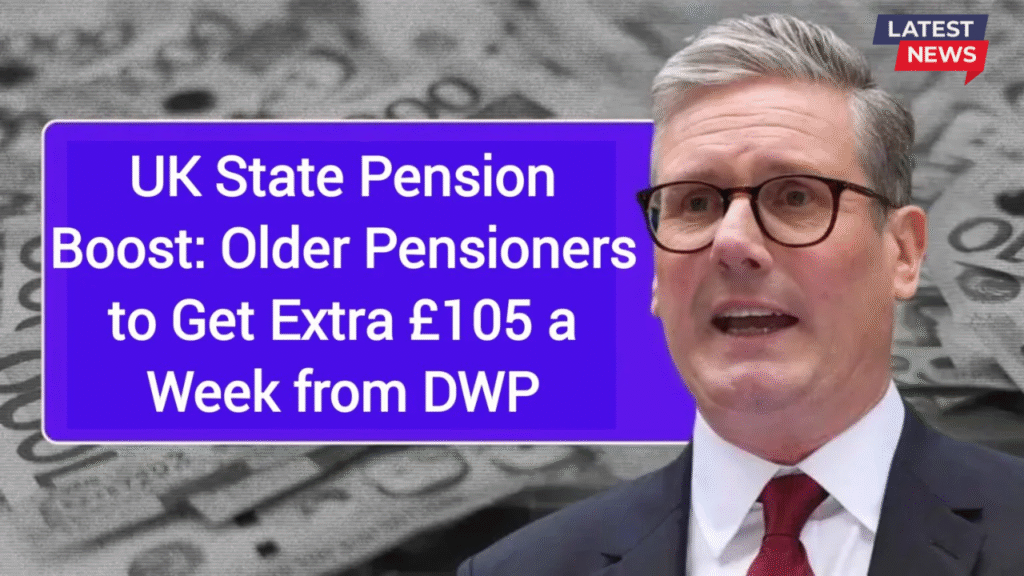The Department for Work and Pensions (DWP) has announced a significant boost to the UK state pension payments starting from the next financial year. Eligible pensioners could see an increase of up to £105 per week, one of the largest uplifts driven by inflation and wage growth under the government’s triple lock system. This change aims to support pensioners in managing rising living costs while maintaining a decent standard of retirement living. Understanding the eligibility criteria, payment process, and financial implications is crucial for pensioners to plan effectively.
Eligibility for the £105 Weekly Increase
This additional payment primarily targets pensioners on the basic and new state pensions who meet age and National Insurance contribution requirements. Pensioners born before certain cut-off dates, as well as those with qualifying years of National Insurance contributions, are most likely to benefit. Those who have deferred their pension or receive means-tested benefits might also receive higher payments. It is recommended to check the National Insurance record via the government portal to confirm eligibility.
Payment Delivery Method
The boost will be paid directly into pensioners’ bank accounts alongside their usual pension payments on regular payment dates. Most pensioners do not need to apply separately but should ensure their contact and bank details are current with the DWP. Payments will be consolidated with normal state pension amounts for ease of tracking.
Reason Behind the Pension Increase
The increase results from the government’s triple lock methodology that guarantees state pension rises by the highest of inflation, average earnings growth, or a minimum of 2.5%. For 2025, wage growth of around 4.1% triggered this substantial increase, designed to help pensioners cope with inflation and energy cost hikes while reducing elderly poverty.
Tax and Benefits Considerations
The rise in state pension income may affect tax liabilities and entitlements to means-tested benefits, such as Pension Credit or Housing Benefit. The DWP will adjust many benefits automatically, but pensioners should review their overall income and consult HM Revenue and Customs (HMRC) if necessary to avoid unexpected tax bills.
Checking Your State Pension Forecast
Pensioners are encouraged to check their pension forecast on the official UK government website before the new payments start. This allows them to verify their qualifying years, understand entitlement amounts, and explore options for voluntary National Insurance contributions to fill gaps and enhance pension payouts.
Action Steps if Your Pension is Incorrect
If pensioners suspect their payments are incorrect, the DWP provides support through helplines and online forms to report issues. Overdue or underpaid amounts can often be backdated, potentially resulting in lump sums on top of the increased weekly pension.
Basic vs. New State Pension Differences
The UK pension system has two versions: the basic state pension for those reaching pension age before April 2016, and the new state pension for those after. Both types will increase, but the amount and eligibility differ based on birth date and contribution history. Pensioners should understand which system applies to them to gauge how the new £105 increase affects their payments.
Budgeting with the Extra Income
The £105 boost will provide pensioners with greater flexibility to manage expenses such as utilities, groceries, and transportation. Some may choose to save, invest, or pay off debts. Financial planning tools and advice can help pensioners incorporate this increase effectively into their retirement budget.
Future of the Triple Lock Policy
The triple lock has been a key driver of pension growth but is subject to government review. Pensioners should stay updated on policy changes as economic conditions might lead to adjustments in how future pension increases are calculated.
International Comparison
This boost narrows the gap between the UK and other European countries in pension generosity, highlighting government efforts to support older citizens amid economic challenges. Pensioners with international pension arrangements should consider professional advice to understand combined impacts.
Preparing Ahead of April 2025
Pensioners should update personal information with DWP, check their National Insurance contributions, review benefit eligibility, and consider financial advice to maximize the benefits of the 2025 pension increase.
Frequently Asked Questions
Common concerns include eligibility for those living abroad, interaction with private pensions, and effect on means-tested benefits. The DWP and organizations like Age UK offer detailed guidance to help pensioners understand their rights and optimize the new pension arrangements.
